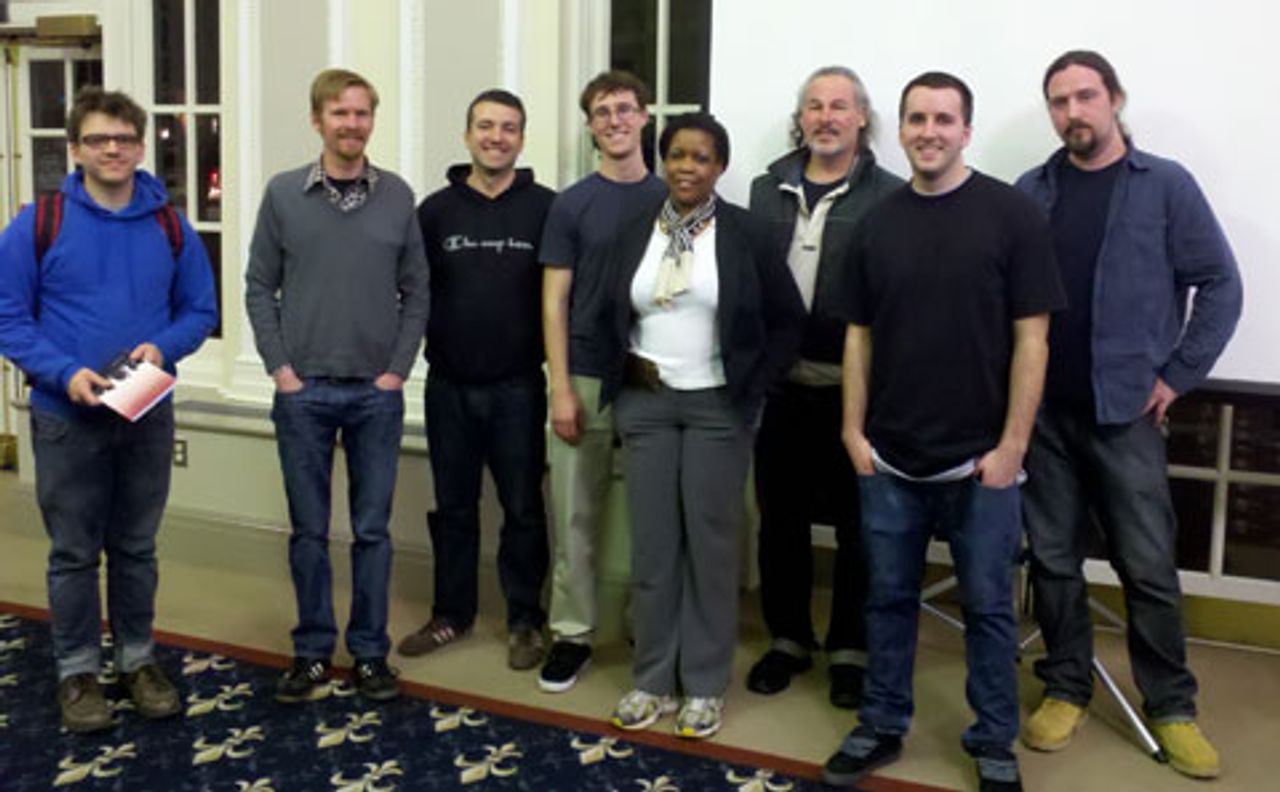Phyllis Scherrer, vice presidential candidate of the Socialist Equality Party, spoke in her home city of Pittsburgh last week. The report, presented at the University of Pittsburgh, attracted about 20 students and workers from throughout the city. Students from both the University of Pittsburgh and Carnegie Mellon University attended, as well as several students from a local high school.
 Scherrer with supporters at the University of Pittsburgh
Scherrer with supporters at the University of PittsburghThe meeting followed weeks of campaigning by supporters of the SEP. In February, members of the International Students for Social Equality campaigned with Scherrer at public hearings on cuts in public transit. (See: “SEP vice presidential candidate denounces transit cuts at Pittsburgh forum”)
Campaigning continued with leafleting at local universities and talking with students. In these campaigns, Scherrer, a grade school teacher, spoke with students about the attacks on public education from both the Democrats and the Republicans.
For more than a century, steel manufacturing and coal mining dominated the economy of the Pittsburgh area. Generations of immigrants from Europe settled in the region, attracted by the promise of work in the mills. As part of the deindustrialization of much of the American Midwest, however, tens of thousands of jobs were wiped out, beginning in the 1980s.
The unemployment rate in Pittsburgh is slightly less than the national average. However, the official figures do not begin to reveal the real social crisis in the city. Moreover, those employed in the two main remaining sectors, health care and education, make far less than workers did a generation or two earlier. And the situation in the former steel towns that dot the rivers is catastrophic.
At the meeting on Thursday, Scherrer said, “The most essential questions—the ever-increasingly impossible conditions of life, the explosion of social inequality, the erosion of core democratic rights and war are not being debated in the election campaign.”
Scherrer then went on to discuss the breakdown of democratic rights, including the Obama administration’s defense of the extra-judicial assassination of American citizens. The report turned to the prospects of war, rooted in the attempt by the American ruling class to offset its declining economic hegemony through force.
Discussing the implications of the threats of military action against Iran, Scherrer said, “The subjugation of Iran, a country three times the size of Iraq, with three times the population, would involve a massive mobilization of troops that would inevitably require a draft and a general call up of young men and women in the US.”
Discussion at the meeting focused on clarifying the way forward for workers and the role of practical work.
One of the high school students present asked, “I agree with everything you are saying, but what are the solutions to these issues?”
Scherrer responded, “There are no simple answers to the issues facing us. What is required is the building of a new leadership of the working class based on the perspective of international socialism. Only through the independent mobilization of the working class can the issues of unending war and declining living standards be resolved.”
A student from Carnegie Mellon University asked for clarification on the importance of internationalism. A worker in the audience responded, “They try to pit the workers against one another, telling us that workers in China and Mexico are their enemies, in order to divide us and keep us weak.”
Scherrer added, “The ever-greater integration of the world economy requires the most complex global coordination of the world’s producers, yet this is obstructed by the private ownership of the means of production and the division of the world into rival nation-states. This contradiction cannot be solved on a national scale. It requires an international movement of the working class.”
After the meeting, those attending stayed for informal discussion. A group of students from Shaler Area High School, north of downtown, had seen a poster for the meeting when in the area the previous Saturday and decided to come down.
They pointed out that they were all about six years old at the time of the September 11 attacks, and that their entire lives were dominated by war.
The students expressed their frustration over their lack of options: unemployment, massive debt accumulated by going to college, or the military. “We live in the suburbs were everyone is supposed to be so successful,” one said, “but all we hear is our parents worry about losing their jobs.”
Scherrer explained that the crisis is hitting the entire working class, and that young people do not have a viable option for the future. “This is why our goal is organizing a struggle against the system of a handful of billionaires. Our opponent is not the working class and poor of another country, but the ruling class within the United States.”
An older worker asked about the SEP’s positions on the unions. He had worked for Allegheny County for 20 years. As a union shop steward, he often came into conflict with both management and the union. “I was fired, and the union didn’t do anything to help me. They wanted me out, just a much as the county did.”
A Romanian student attended and expressed support for the SEP campaign. He asked about the history of the Socialist Equality Party and the position of the Trotskyist movement in Romania. He said that the fall of Stalinism was supposed to create such wealth, but that things had only gotten worse.
Scherrer explained that the SEP’s history could be traced back to the October Revolution. She then spoke on the founding of the Fourth International by Leon Trotsky in opposition to the rise of Stalinism.
